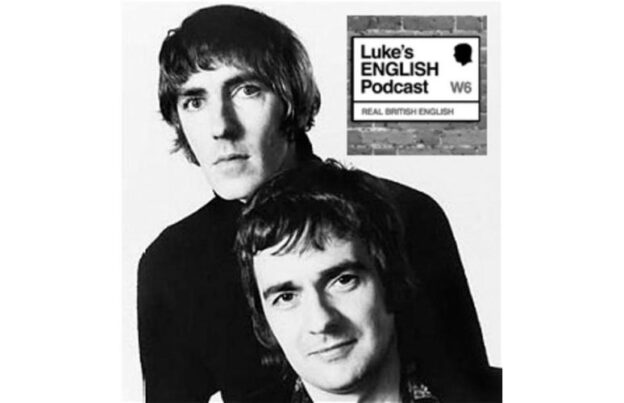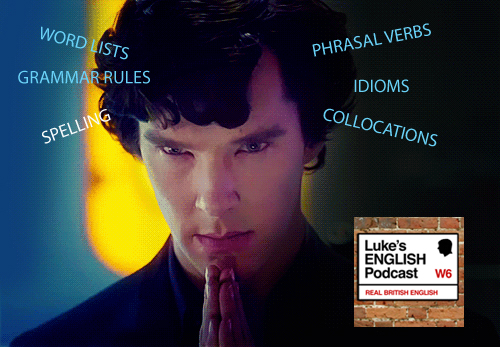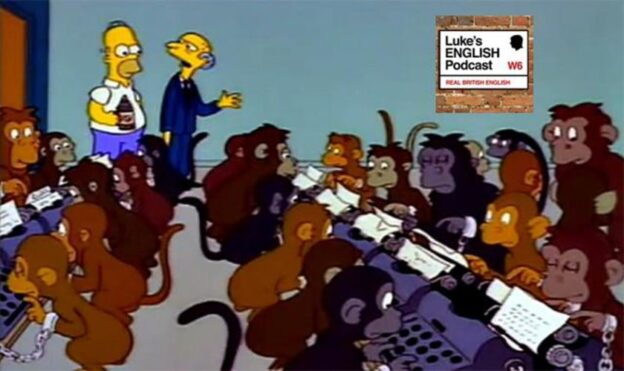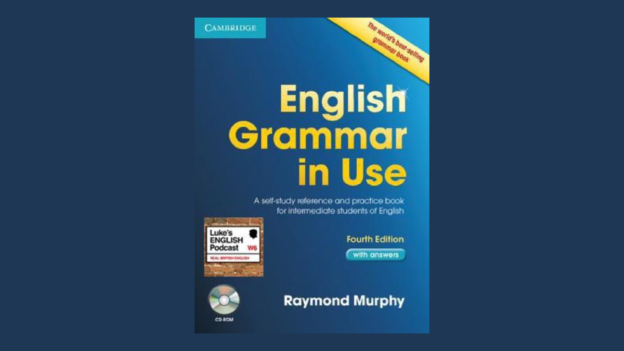Listen to two comedy sketches from the 1960s, learn some popular cultural history, pick up some vocabulary and hear some posh English accents.
Download Episode 
I highly recommend that you purchase this BBC DVD of The Best of Peter Cook & Dudley Moore. It’s really funny!
Introduction (with transcript)
Hello everyone, welcome to the podcast. In this episode we’re going to listen to a sketch from a comedy show called “Not only.. but also”, which was first broadcast on the BBC back in the sixties, when TV was in black and white and there were only 3 channels.
I’d love to tell you all about this show, and the people who made it. Peter Cook and Dudley Moore are basically the fathers of modern British TV comedy. I’d love to tell you all about how before Monty Python even existed, Peter Cook & Dudley Moore were doing surreal, satirical and anti-establishment comedy on BBC TV, and getting huge audience ratings, and inspiring generations of people. I’d also love to tell you more about the history of British comedy, because for some reason it’s very important to me. It’s one of my favourite subjects. It just feels significant, and I want to share it with you. Listening to these things is good for your English, but ultimately the reward is even greater than that – you can enjoy listening to something that’s a little bit special. But I also realise that you might not have the same level of slightly fanatical interest in the history of comedy, as I do. I could bang on about some comedians from the 1960s, but you might think “this is interesting Luke, but let’s just listen to some of their work shall we?” So, I’ve decided to just skip through all the stuff about the history of comedy and go straight to a couple of sketches, tell you about them, help you to understand them, and then later in this episode I’ll give you a little history lesson on Peter Cook and Dudley Moore, and their place in the history of pop culture, and then not only will you be able to enjoy their comedy, but you’ll learn more about British cultural history.
So, let’s focus on the sketch. I’m just going to explain the context for you and then you can listen to it, and see if you get what’s going on.
First sketch: Peter Cook & Dudley Moore “A bit of a chat” aka “The facts of life”
In this scene you’ll hear a father talking to his son about a slightly sensitive topic. The scene was written and filmed in the early sixties, probably 1964.
First, just listen (there is a script below, but try listening without it first)
Just listen to this and try and work out what is going on. Then I’ll explain things, and you can hear it again. There’s a script available for this sketch on my webpage.
As you listen you should try to work out what’s happening here. Why is this such a strange conversation? And why is the audience laughing? You might need to “read between the lines” which means look beyond what is just being said in order to discover the hidden meanings or suggestions at work.
How much of that did you understand? Did you get the humorous aspects of it? Let me explain the context, and the main points of the sketch.
*Sketch starts – “A Bit of a Chat”*
(See below for the script)
What happened?
Context
What do you know about Father/Son relationships in the UK in the 1950s & 60s?
They were more formal, especially among upper-class or upper-middle class families. Sons would call their father ‘sir’. They’d be very respectful, as if talking to someone of much higher status. They probably didn’t spend a lot of time together. These days, fathers and sons from normal middle-class families are quite close. They share quite a lot, and are able to talk quite openly about sensitive subjects like relationships or sex education. It might be embarrassing for the boy, but basically, the father feels quite comfortable doing it, and it’s normal and accepted. Back in the 50s or 60s, it wasn’t exactly the same. I suppose British men were less ‘in touch with their feelings’ and found it very awkward to discuss sensitive personal topics openly. Instead they may have dealt with them in the same formalised and distant way as they would talk about other topics. Also, we wonder how much most people really knew about sexual education in those days. Back in the 1950s or early 60s, before the era of sexual liberation, I think that a lot of people were completely in the dark about reproduction and all that kind of thing.
How about now? Are people more comfortable when talking about topics such as reproduction and sex?
Not completely, but certainly more so than 50 years ago.
The Class System & Boarding Schools
A little bit about the class system – particularly the upper class.
Nowardays, most people are middle class. In fact, many people believe that we don’t have a formalised class system these days. 50 years ago, the UK was more divided by class. Lower class (working class), middle class and upper class. Let’s look at traditional upper class culture. The upper class, or upper middle classes were considered to be:
Wealthy, educated, respectable and quite formal. Not liberated sexually, but bound by polite & formal social conventions. They would have been quite prudish about sex, finding it very embarrassing to talk about the subject. Many of the men would have been educated in exclusive, single sex boarding schools, which by all accounts would have been pretty cold, very formal and quite brutal. The boys never mixed with girls and grew up to be pretty clueless about sex. Kids and their parents didn’t spend a lot of time together, because of the boarding schools, and a father was more like a master than a friendly Dad.
Vocabulary
It seems that very posh people, from this period, often don’t really say exactly what they mean. They might make something sound more trivial than it actually is. For example “I had to give someone rather a ticking off” = means “I quite forcefully reprimanded someone for doing something wrong”
rugger – rugby
grubby – dirty / muddy
having a crafty smoke – secretly having a cigarette
give someone rather a ticking off – telling someone off
it’s a filthy habit – it’s a dirty habit
to cope with someone – to deal with someone
to get up to something – to do something (naughty)
Remember – it’s all about reading between the lines. What’s really going on? What really happened?
What does each line of dialogue really mean. E.g. the line about “there’s a cup of tea in here if you’d like one” means – come and sit down because I need to talk to you. The lad doesn’t want to, because, well, it’s probably awkward to talk to the old man, and this sounds like it could be serious.
Let’s listen to it again now, and consider each line, what is going on, and what is funny.
Second Listen
Questions
What does the Father want to talk about?
Why does the Father feel he has to talk about this?
What does the Father mean by “The opposite number?”
Why does the Father talk about sitting on a chair, etc?
Who is Uncle Bertie?
What is Uncle Bertie’s relationship with the boy’s mother?
A Bit Of A Chat (Script)
Roger, aged almost eighteen, arrives home from school, whistling: All Things Bright and Beautiful. His Father wants to have a bit of a chat with him about something. Just, a bit of a chat…
Father: Is that you, Roger?
Roger: Yes, father.
Father: There’s a cup of tea in here, boy, if you’d like one.
Roger: It’s very kind of you, sir, but I’ve just come in from rugger, and I’m a bit grubby. I think I ought to go and have a shower first, sir.
Father: Well pour me a cup, there’s a good chap, would you?
Roger: Certainly sir, yes, of course.
Father: Thank you. How was school today?
Roger: Oh, much as usual, thank you sir, but I caught someone having a crafty smoke behind the wooden building. I had to give him rather a ticking off — such a filthy habit, you know.
Father: It’s a filthy habit, Roger.
Roger: There we are, sir. Now, if you’ll excuse me.
Father: Roger.
Roger: Yes sir?
Father: Er — sit down. Roger, your mother and I were having a bit of a chat the other day, and she thought it might be a good idea if I was to have a bit of a chat with you.
Roger: Er… a bit of a chat, sir?
Father: A bit of a chat, yes, Roger, just…
Roger: Er…
Father: A bit of a chat.
Roger: What about, sir?
Father: Well, there’s nothing to be worried about, Roger, it’s just that, er, well, to be perfectly frank… how old are you?
Roger: Well, to be perfectly frank, sir, I’m coming up to eighteen.
Father: Coming up to eighteen…
Roger: Well, on the verge of…
Father: On the verge of eighteen… Yes, well, I thought it might be a good idea to have a bit of a chat now, because I remember, from my own experience, that it was when I was just, you know, coming up to eighteen…
Roger: On the verge…
Father: …on the verge of it, that I first began to take a serious interest in the – um – in the – er – opposite… the opposite… number. Now I don’t know, Roger, if you know anything about the method whereby you came to be brought about.
Roger: Well, sir, some of the boys at school say very filthy things about it, sir.
Father: This is what I was worried about, and this is why I thought I’d have a bit of a chat, and explain, absolutely frankly and openly, the method whereby you, and everybody in this world, came to be. Roger, in order for you to be brought about, it was necessary for your mother and I to do something. In particular, it was necessary for your mother… it was necessary for your mother – to sit on a chair. To sit on a chair which I had recently vacated, and which was still warm from my body. And then, something very mysterious, rather wonderful and beautiful happened. And sure enough, four years later you were born. There was nothing unhealthy about this, Roger, there’s nothing unnatural. It’s a beautiful thing in the right hands, and there’s no need to think less of your mother because of it. She had to do it – she did it – and here you are.
Roger: Well sir, it’s very kind of you to tell me. One thing, actually, slightly alarms me; um, I was sitting in this very chair yesterday sir, and I vacated it, and the cat sat on it while it was still warm. Should we have it destroyed?
Father: Its a lovely chair, Roger…
Roger: I mean the cat, sir.
Father: Destroy… oh, no Roger, you don’t understand. This thing of which I speak can only happen between two people who are married. And you’re not married.
Roger: Not yet, anyway sir.
Father: Not to the cat, in any case. Well, Roger, now that you have this knowledge about chairs and warmth, I hope – I hope you’ll use it wisely, and take no notice of your school friends, or what Uncle Bertie may say.
Roger: Dirty Uncle Bertie they call him.
Father: Dirty Uncle Bertie – and they’re right, Roger. Bertie’s a dirty, dirty man. He’s been living with us now for forty years, and it does seem a day too much… You know, if it hadn’t been for your mother, Roger, I don’t know where we would have been. She’s the only person who can really cope with Uncle Bertie, she’s the only one who can really deal with him. I don’t know if you realise this, Roger, but your mother even has to sleep in the same bed as Uncle Bertie, to prevent him getting up to anything in the night. If only there were more people like your mother, Roger.
Roger: Well, I’m very pleased that you’ve told me this, sir, because, as I say, I’m very glad I don’t have to believe all those filthy things that the boys at school say, and only yesterday, Uncle Bertie said to me…
Father: Take no notice of Uncle Bertie, Roger! He’s a sick, sick man, and we should feel sorry for him.
Roger: Well, I’ll try, sir… well.. thank you sir. Er – I wonder if I should take a cup of tea up to mother, while…
Father: I – er – I wouldn’t do that, Roger – she’s upstairs at the moment, coping with Uncle Bertie…
Roger: Poor Uncle Bertie…
Father: Poor Uncle Bertie…
And here’s the garden party sketch. It comes from another great BBC TV show called “The Fast Show”, which was Johnny Depp’s favourite British TV show.
The Psychiatrist Sketch (Script)
Braintree: Come in.
[Enter Roger.]
Hullo, Roger.
Roger: Hullo, Dr Braintree.
B: Hullo, come in.
R: I’m sorry I’m late.
B: That’s quite all right – how are you?
R: I’m very well, thank you.
B: Would you like to sit down, or would you prefer to lie.
R: Uhm, I’ll sit, thank you.
B: Right, well, sit down. Tell me, how are you in yourself?
R: I’m feeling just great.
B: Oh, this is terrific.
R: Yes, and it’s more than I expected from our sessions. You know, if anyone had told me that talking to psychiatrists could have help me at all, I would have laughed in their faces.
B: Yes.
R: But I can honestly say that our little chats together have really been of tremendous help to me.
B: I’m so glad, Roger: of course a lot of people are instinctively suspicious of psychiatry, but it can help at times.
R: Well, I really think it can, because you know, I’ve got so much self-confidence now. I’m much less self-conscious in the company of the opposite sex, whichI wasn’t, as you know.
B: Yes, yes, yes, yes. You’re less inhibited, are you?
R: [Suggestively] Oh yes, I should say so.
B: Good, this is terrific.
R: And the wonderful thing about it all is … well, I’m in love.
B: Well, this is wonderful news, Roger – you’re in love. – With a woman?
R: Yes.
B: So much the better – that’s terrific.
R: You know, it’s so wonderful to be in love – I can’t tell you the absolute joy I have. … this girl, this creature
[emotional]
, this goddess …
R: I mean, she’s
B: Yes …
R: She’s so, you know, it’s so right. Everything is so wonderful, you know.
B: Yes, yes – you really click together.
R: Yes. Oh, it’s so marvellous, but – the only trouble is that, apart from this wonderful light-hearted love I have, I seem to be saddled with this tremendous burning sense of guilt.
B: You have guilt as well as love: well, this is unfortunate, Roger. You know, sex is the most wonderful natural, healthy thing in the world. There’s no reason at all to have any guilt about it. I mean,why should you have guilt about sex?
R: Well, it’s not really as simple as that, you know – it’s rather difficult to explain. Uhm, I don’t reallyknow where to start. It’s rather difficult to explain. Uhm, I don’t really know where to start.
B: Well, begin at the beginning. That’s always the best place. What’s the girl’s name.
R: [Pause] Stephanie.
B: Stephanie. That’s a lovely name, isn’t it – well, my wife’s name in fact, isn’t it?
R: Yes, it’s Stephanie.
B: Yes, it’s Stephanie.
R: Yes, it’s Stephanie.
B: No, it’s Stephanie.
R: Yes, it’s Stephanie: it’s your wife.
B: Oh, you’re in love with my wife, Stephanie. Well, this is a perfectly understandable thing, Roger. She’s a very attractive woman – I married her myself. I don’t see why you should feel upset about that.
R: But she’s in love with me.
B: Well, this is again perfectly understandable, Roger. I mean, you’re a perfectly attractive human being, as I’ve told you over the last few weeks. There’s nothing repulsive about you, is there? There’s no reason why a highly sexed woman such as Stephanie shouldn’t fall in love with you. And I must explain to you, Roger, that I’m a very busy man: I have many, many patients to see – I see rather less of my wife perhaps than I should, and I think it’s very understandable she should seek some sort of companionship outside the marriage – I don’t think that’s unreasonable at all.
R: But she’s not seeking anything outside marriage – nor am I. We want to get married.
B: Well, this again is perfectly understandable. After all, you’re two young people in love and you want to express your feelings within the confines of a bourgeois society through marriage. I think it’s very appropriate.
R: The awful thing is, you see – I should feel so grateful to you for what you’ve done. And all I can feel is this burning jealousy – I can’t bear the thought of you touching her.
B: Well, of course, I understand this. One is tremendously possessive about someone one loves … it would be unhealthy not to have this jealous reaction, Roger.
R: But don’t you see – I hate you.
B: Of course you hate me, Roger.
R: I hate you for being so near her.
B: Yes, of course you hate me, Roger. You love to hate the one who loves the one you hate to love the one you hate. This is a very old rule, Roger – there’s nothing to feel ashamed about. It’s absolutely reasonable.
R: Don’t you understand – I want to kill you.
B: Of course you want to kill me. Because by killing me , Roger, you eradicate the one you hate. This is a perfectly natural reaction, Roger.
R: You’re so reasonable, aren’t you.
B: Yes, I am.
R: [Getting cross]
You understand it all so much …you are so logical.
[Gets up to strike him.]
B: Yes, I am – it’s my job.
R: I’m going to have to kill you
now
!
B: Ah – Roger – this is a little inconvenient, because I have another patient a six-thirty and then there’s someone else at seven after that. I wonder if you could make it some time next week.
[Standing over him.]
Could you make it early in the week, say?
R: [Pause – relax] When do you think?
B: How are you fixed on Wednesday morning? Say nine-thirty – would that be convenient?
R: Yes, that’s perfect.
B: Right, well, if you could pop along at nine-thirty and kill me then.
R: Once again, Doctor Braintree, I’m amazed, you know, really. I’m so grateful to you for showing me the way.
B: That’s what I’m here for, Roger.
R: Thank you very much. Thank you.
B: And with a bit of luck, this should be the last time you need to visit me
Comments
I think it’s pretty clear what’s funny about this. The psychiatrist has cured Roger and he feels so happy to be in love, but it turns out that Roger is in love with the Psychiatrist’s wife Stephanie. The psychiatrist doesn’t fly into a jealous rage – in fact he’s ridiculously logical and reasonable about it. This sketch allows us to imagine what the psychiatrist must be like at home – so reasonable all the time, he must be no fun at all. No passion, just plain dedication to his job; the rational understanding of psychology at the expense of natural human emotions and feelings, which is unnatural and ridiculous, as well as frustrating. It could be a wider statement about psychiatry, but let’s not analyse it too much. It’s just funny listening to the reactions, and the nicely written lines.
Vocabulary
There may be some words and expressions that you don’t know, or that could be useful to you. Let’s have a look:
terrific
our little chats together have really been of tremendous help to me
I’m much less self-conscious in the company of the opposite sex, which I wasn’t, as you know.
B: Yes, yes, yes, yes. You’re less inhibited, are you?
you really click together.
I seem to be saddled with this tremendous burning sense of guilt.
There’s nothing repulsive about you
There’s no reason why a highly-sexed woman such as Stephanie shouldn’t fall in love with you
You want to express your feelings within the confines of a bourgeois society through marriage.
I can’t bear the thought of you touching her.
Because by killing me , Roger, you eradicate the one you hate.
If you could pop along at nine-thirty and kill me then.
That’s it! Don’t forget to listen several times to get the full benefit!
Feel free to leave comments and questions below.
Thanks for listening,
Luke




 If you like ukulele music, listen to the end of this episode!
If you like ukulele music, listen to the end of this episode!

